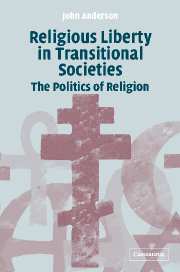Book contents
- Frontmatter
- Contents
- Preface
- 1 Introduction
- 2 Southern Europe: Spain and Greece
- 3 Central and Eastern Europe: Poland and Bulgaria
- 4 The former USSR: Russia and the successor states
- 5 Justifying religious ‘recognition’ and/or discrimination
- 6 Conclusion: culture, conflict, modernisation and religious liberty
- Select bibliography
- Index
5 - Justifying religious ‘recognition’ and/or discrimination
Published online by Cambridge University Press: 22 September 2009
- Frontmatter
- Contents
- Preface
- 1 Introduction
- 2 Southern Europe: Spain and Greece
- 3 Central and Eastern Europe: Poland and Bulgaria
- 4 The former USSR: Russia and the successor states
- 5 Justifying religious ‘recognition’ and/or discrimination
- 6 Conclusion: culture, conflict, modernisation and religious liberty
- Select bibliography
- Index
Summary
In all of the transitional societies we have examined so far there have been wide-ranging debates over the place of religion, though in some countries the issue has enjoyed a greater political salience than others. In these discussions different actors have put forward a variety of arguments to justify granting some churches formal ‘recognition’ in the new polities, or to defend legal discrimination against religious minorities. The emphasis of the individuals and institutions involved in this discussion vary according to their ideological and institutional needs, but a number of broad types or families of argument are evident from a reading of the available sources. These include suggestions that the dominant church:
is the religious community of the people, of the majority, or of the nation, and thus deserves some formal ‘recognition’;
has the right to exercise some form of ‘moral guardianship’, and requires the state to provide some form of protection from unfair competition;
all this is reinforced by a general need in transitional societies for order and stability in the face of uncertainty, and this requires regulation of inappropriate or divisive religious activity;
and in any case, why should our country slavishly follow models of church–state relations developed elsewhere that reflect different cultural and religious contexts, and that have the potential to undermine the process of national rebuilding currently being undertaken?
- Type
- Chapter
- Information
- Religious Liberty in Transitional SocietiesThe Politics of Religion, pp. 166 - 188Publisher: Cambridge University PressPrint publication year: 2003



